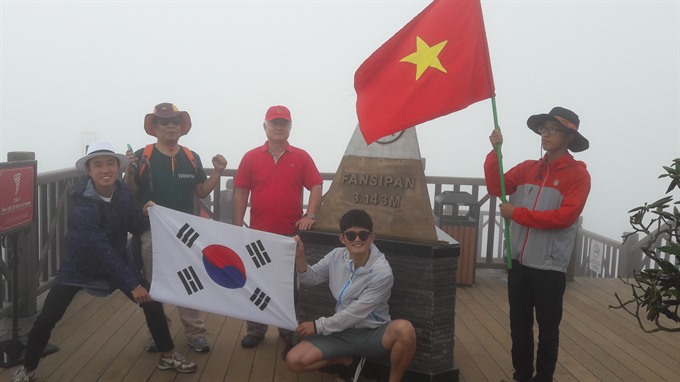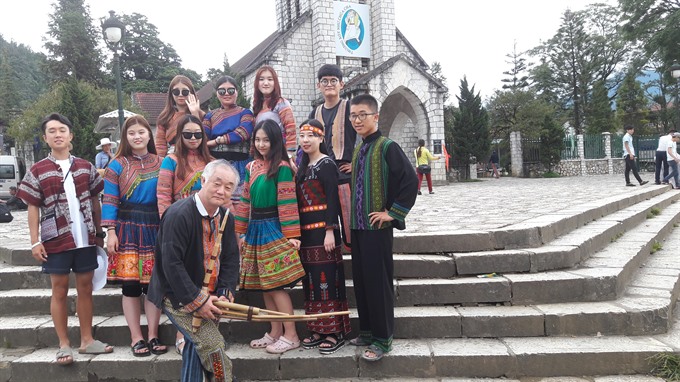Viet Nam News
Thien Huong
After more than 40 years studying Vietnamese, Professor Ahn Kyong Hwan’s biggest joy is introducing Vietnamese history and culture to South Korean people.
His valuable body of work consists of dozens of books on Viet Nam, including Nhat Ky Trong Tu (Diary in Prison by President Ho Chi Minh), Truyen Kieu (The Tale of Kieu by great poet Nguyen Du) and Hoi Ky cua Dai Tuong Vo Nguyen Giap (Memoirs of General Vo Nguyen Giap). He will publish a new book of Ho Chi Minh’s poems in September this year.
He always believes that the translation of Diary in Prison is a bridge between the two nations.
“Now more South Korean people will know who Ho Chi Minh is and what he did during his life to bring independence to Viet Nam,” he said, “I’m happy about that.”
In order to bring his closer to the public, he co-ordinated with many South Korean calligraphers to write Ho Chi Minh’s poems in a calligraphic style and exhibit them in many big South Korean cities, as well as in Viet Nam.
“Before translating the diary in 2002, I did not know much about Viet Nam’s leader,” he said, “I only knew that all Vietnamese people respect him. When I translated the work, I understood why.
“I was proud that Asia had such a great writer,” he said, “The collection expresses the leader’s love for nature, people, life and his patriotism as well as his desire for freedom.
“The elements of an Eastern philosopher included humanity, wisdom and bravery,” he said.
When translating any work from Vietnamese to Korean, Prof Ahn pays lots of attention to choosing the right words as well as searching for other materials to achieve accuracy and precision.
Prof Ahn was impressed with Vietnamese characteristics of bravery, friendliness and hospitality.
 |
| Flying the flags: Prof Ahn (middle) and his students on a trip to Lao Cai Province. — Photo courtesy of Prof Ahn |
Fate with Viet Nam
Prof Ahn started studying Vietnamese at the Vietnamese Faculty of South Korea’s Foreign Languages University in 1974.
“At that time, there were no Korean teachers teaching Vietnamese,” he said, “The university invited staff from the Vietnamese Embassy in Seoul to teach us. Then, relations between South Korea and Viet Nam were interrupted until 1988. In December, 1992, the two countries established diplomatic ties, and South Korean enterprises started to invest in Viet Nam, which resulted in a large number of South Korean students learning Vietnamese.”
In 1989, he was appointed to work as branch director of Hyundai Thailand in HCM City. In 1993, he graduated with a Master’s degree in Vietnamese and three years later, he was awarded with a Doctorate from HCM City’s Social Sciences and Humanities University.
On returning home, he taught Vietnamese and culture at Yong San University. Since 2006, he has taught at Chosun University in Gwangju City. He has also acted as chairman of the Vietnamese Research Association since 2014.
“Many people asked me why I switched from doing business to teaching, I said it was because I love Viet Nam and the Vietnamese soul,” he said.
“For me, Viet Nam has never been a foreign country,” he said.
“I love Viet Nam for all aspects,” he said, “I love Vietnamese people for their simplicity and strength. Viet Nam is home to a great people, where both men and women are heroes.”
Prof Ahn always tells his students that Viet Nam and South Korea have four things in common.
First, in geography, the countries are both in the shape of a letter ‘S’, close to the East Sea.
In culture, the two peoples are influenced by Confucianism with similar ways of thinking.
Both peoples care a lot about tradition.
The two countries have also been invaded by foreign countries and have been divided between South and North.
The descendants of the Vietnamese Ly Dynasty are living in South Korea.
And now, many South Korean men get married to Vietnamese women. Hence the two people share the same blood.
 |
| Dressed up: Prof Ahn (first row) and his students pose for a photo in Sa Pa in Dao ethnic costumes. — Photo courtesy of Prof Ahn |
“But I admire Viet Nam as Vietnamese people have the phrase ‘dong bao’ (which means being born from the same pile of eggs according to the legend of Mother Au Co, who gave birth to a pile of 100 eggs, which then hatched into 50 boys and 50 girls. They were the ancestors of the Vietnamese people; and figuratively means ‘compatriot’.)
Prof Ahn said he wants to do more to support Vietnamese brides getting married to Korean men.
“There are more than 20,000 Vietnamese women married to Korean men,” he said, “The number increases by 7,000 to 9,000 people every year. There are more and more Vietnamese people seeking jobs in South Korea. But Vietnamese brides living in South Korean don’t speak Korean, don’t know Korean customs and South Korean grooms do not know anything about Viet Nam."
The book he co-wrote with author Tran Thi Thu Luong titled Handbook for Multi-Culture South Korea and Viet Nam Families will be published later this year.
He now teaches Vietnamese language, history, culture and society at the English Language Faculty, Chosun University, and online for South Korean students.
"The number of students registering for my subject has never fallen," he said. "Last term, 800 students signed up for my courses."
Visiting Viet Nam from time to time, Prof Ahn said he likes Vietnamese dishes like cha ca La Vong (grilled fish), bun dau (vermicelli with fried tofu), and rau muong xao toi (morning glory fried with garlic). — VNS